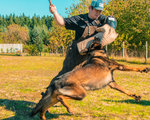
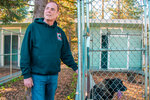
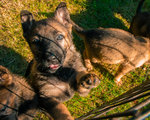
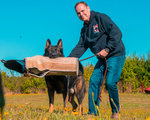
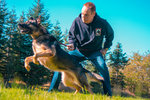
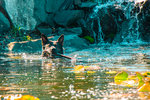
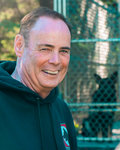

Editor’s Note: The Chronicle is working to assist local businesses suffering from the effects of the COVID-19 virus spread and associated government orders to close or limit commerce. There will be a feature on a local business in each edition of The Chronicle and at chronline.com moving forward. To be considered, email reporter Eric Trent at etrent@chronline.com. Additionally, The Chronicle will continue to offer its coverage of the coronavirus and its effects across the community, state and nation free outside of our paywall at chronline.com.
ROCHESTER — Max, a 6-year-old German shepherd, is crouched motionless in a grassy yard on a sunny Tuesday in Rochester; his eyes fixated on a figure 25 yards away. “Pack em!” yells Wayne Curry as the canine bolts upright and tears off toward a man in a full body suit of protective gear. Max springs to the air in one fluid motion, clamps onto a protective arm sleeve and rips it off the trainer’s arm. Max does a victory lap around the yard with the sleeve in his mouth.
Max, a large alpha male with a smooth black coat, is Curry’s personal pet and the most highly-trained dog at his Kraftwerk K9 company, a German shepherd training and breeding facility located on the rural outskirts of Rochester. And Max, who snaps to attention at a bevy of commands that Curry reels off in German, is the prime example of what all of Curry’s 30 adult German shepherds are trained and bred in doing: protection, obedience and tracking.
Unassuming passersby may notice the wrought iron fence with the company name and the giant German Shepherd emblem, but have no idea that one of the top German shepherd trainers and handlers in the world works just beyond the fence.
Der Speigel, one of Europe’s most-read news websites, named Curry the most successful German shepherd breeder in the U.S. in 2011. Germans now travel 5,000 miles to Rochester just to buy dogs from him.
Curry first became interested in the breed after his father bought him a male, King, and female, Willy, when he was 8 years old, and he began training and preparing them for shows.
He started to get into protection training as an adult when he came home from work one night to find his Rottweiler was chewing on a bone in the front yard while the back door had been kicked in and everything valuable was stolen from his house.
He left his machinist job at Boeing in 1987 to become a full-time obedience trainer in Centralia where he’d go to shelters and pass his business cards out to gain customers.
“The shelter really loved me because they never had to put a dog to sleep,” Curry said. “I would take them out and train them just so I could get a better knowledge base.”
He later entered dog breeding after he couldn’t find a dog that he wanted. For the price of what he could have paid for six average females, he bought one good one, Chili, which had a litter of six puppies. From there he gained the foundation of what a perfect dog could be.
“I’ve always kept that same picture of what a German shepherd should be like,” Curry said. “My goal never changes.”
He moved to Rochester in 1995, bought an $18,000 mobile home and a five-acre property of Christmas trees for $40,000 and built his first four kennels.
He’s since expanded to 25 acres and has recently installed state-of-the-art kennels that look more like AirBnBs for humans than dog houses. They feature climate-controlled rooms, heated tile floors and ceiling fans with a light. Outside of each dog house is a fenced concrete ring with wood chips in the middle, a design that Curry came up with himself.
He’s trained and bred nearly 600 litters of German shepherd puppies since 1987. His entire facility is surrounded by training fields and four houses that he and his employees live in so the dogs receive 24/7 care year-round. It’s more like a resort for dogs than a kennel.
In the front yard of the facility are foot-tall fences where five litters of puppies roam around in the green grass. Each puppy is friendly and approaches the fence to be pet by anyone who greets them.
Inside the main building, three walls of the lobby are covered in dozens of trophies Curry won while competing in 100 competitions worldwide.
The first German shepherd he handled became a Pacific Northwest Schutzhund Champion. He qualified for the Weltunion der Vereine für Deutsche Schäferhunde (WUVS), the working dog world championships in Germany, on four different occasions, including three years in a row with the same dog. He was the highest-scoring American dog handler at WUVS one year. To qualify for the WUVS, a handler has to compete in three national events in the U.S. and place top five in combined scores.
Curry was the first handler in history to have not just one, but three American-bred dogs compete in the Bundessiegerprüfung (BSP) German nationals. And in 2007, he won the AKC Working Dog Championship.
“It’s fun to watch when American dogs are in Germany winning,” Curry said.
Curry has since retired from competition and focuses solely on providing trained dogs to private parties, mostly for personal and home protection. He has drawn clients from around the world.
Just as the pet industry boomed during the 2008 recession, Curry is seeing it again with the COVID-19 pandemic. His business has tripled over what it did during the 2008 recession.
“Fear is a motivator,” Curry said. “We have the highest level of fear that I can remember. Fear causes people to think about protecting themselves.”
German shepherds are the perfect security measure, Curry said. They are not concealed like a handgun. They’re very visible. If a person is going to break into a house, they’re going to choose the one that doesn’t have the German shepherd in the yard, he said. His dogs aren’t just protection animals, either. They are friendly and safe around children, he said. As this reporter toured the facility, each dog they encountered was friendly and pettable.
“Private parties are figuring out that they need a dog with courage and a dog with a sound nerve base, which means you can take them everywhere and the dog is always safe and not a dangerous dog,” Curry said. “We don’t have any dangerous dogs on our property.”
His former dogs have risen to all kinds of heights, too. One of Max’s sons is training to compete in the German national championships. Curry sold a female, Pele, to the Seattle Police Department to become a K9 dog. Pele was featured on A&E’s TV show “America’s Top Dog” earlier this year, which is like “America Ninja Warrior” for dogs.
Curry doesn’t like to take all the credit for his dogs, however. It’s not just the training that makes a dog effective at its job, whether it be tracking down bad guys for the police or protecting a home against invaders. One has to find a dog that enjoys doing what a person wants it to do.
A lot of that has to do with breeding and bloodlines, and Curry has some of the top lineages one can find. Dogs are a product of their parents, he said, and if even one puppy does not turn out to be like its parents, Curry will stop breeding that line.
Curry’s training just enhances what the dogs naturally have, and he uses it to maximize their ability and effectiveness. Courage, hardness and fighting drive are the traits evaluated in the competitions he competed in and those are still the traits he strives for with the dogs he sells.
“A dog doesn’t pass on his training, he passes on his genetics,” Curry said. “The ideal dog has really good genetics and really good training… you don’t have to teach a dog that has natural drive, and that’s what I have, is dogs with natural drive.”